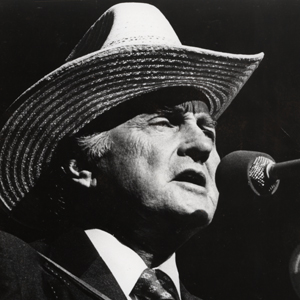An enormously influential figure in twentieth-century American music, Bill
Monroe is rightfully known as "The Father of Bluegrass." He mixed the old-time
country music of his Kentucky upbringing with blues, jazz and gospel, added an
energetic drive and a focus on instrumental virtuosity, and pioneered a genre
that has resonated for decades.
The youngest of eight children, Monroe was born into a farming family that
loved music. At age 10, Bill took up the mandolin. Within a few years, he was
performing at country hoedowns with his uncle, Pendleton Vandiver, a champion
fiddler (later immortalized in Monroe's classic song "Uncle Pen"). From 1934 to
1938, Bill and his older brother Charlie performed as a popular duet act on
record and at several radio stations. Following his split with Charlie, Bill
formed the Blue Grass Boys, which became the platform for his greatest
work.
From 1946 to 1948, when the group featured Earl Scruggs on banjo and Lester
Flatt on guitar and lead vocals, the Blue Grass Boys were to hillbilly music
what Duke Ellington's orchestra was to jazz — that rare band that was equally
innovative and commercial. The Boys' high lonesome harmonies and breakneck
instrumental solos were all delivered with easy showmanship. Led by Monroe, the
band created bluegrass music. And what gave the music its riveting emotional
center were Monroe's "true life" compositions. Raw and direct, like those of
his country counterpart Hank Williams, Monroe's songs became the core of the
bluegrass repertoire: "Blue Moon of Kentucky," "Will You Be Loving Another
Man," "Rocky Road Blues" and "Can't You Hear Me Calling."
The rhythmic drive of Monroe's music was also a big influence on rock & roll.
Carl Perkins once claimed that the first thing Elvis Presley ever said to him
was, "Do you like Bill Monroe?" The flip side of Presley's first single was a
revved-up version of "Blue Moon of Kentucky."
Ignoring trends, Monroe remained unwavering in his dedication to the acoustic
purity and thematic integrity of bluegrass, touring and recording through the
decades. In the 1980s and '90s, he beat cancer and double bypass surgery, and
kept performing right up until his death in 1996.
In acknowledgment of his cross-genre influence, Monroe is a member of both the
Rock and Roll and Country Music Halls of Fame. Of his sound's enduring appeal,
Monroe once said, "It's plain music that tells a story. It's played from my
heart to your heart, and it will touch you."

 Publicity photo of Bill Monroe, circa 1980s.
Publicity photo of Bill Monroe, circa 1980s. Bill Monroe speaks after being inducted into the Nashville Songwriters Hall of Fame in 1971.
Bill Monroe speaks after being inducted into the Nashville Songwriters Hall of Fame in 1971. Grand Ole Opry star Bill Monroe featured on a show poster, circa 1950s.
Grand Ole Opry star Bill Monroe featured on a show poster, circa 1950s. Bill Monroe in early publicity shot, circa late 1930s.
Bill Monroe in early publicity shot, circa late 1930s. Promotional photo of Bill Monroe for WSM Radio, Nashville, late 1930s or early 1940s.
Promotional photo of Bill Monroe for WSM Radio, Nashville, late 1930s or early 1940s. Bill Monroe performs in the prime of his career, circa 1970s.
Bill Monroe performs in the prime of his career, circa 1970s. Bill Monroe, circa late 1980s or early 1990s, in promotional photo.
Bill Monroe, circa late 1980s or early 1990s, in promotional photo.